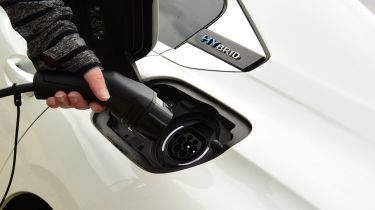Peugeot 508 Hybrid range, MPG, CO2 & charging
As with all plug-in hybrids, getting the best fuel economy from the 508 Hybrid depends on keeping the battery topped up; CO2 emissions are low
| Fuel economy | CO2 emissions | Electric range | Wallbox charge time |
|---|---|---|---|
| 166-235mpg | 29-33g/km | 33-39 miles | 1hr 45mins (0-100%, 7.4kW) |
As is always the way with plug-in hybrids, in order to even get close to the 508 Hybrid's headline fuel-economy figures, you need to charge its batteries regularly. Doing so takes less than two hours, which makes it easy to fit in and around a busy lifestyle. Peugeot's smartphone app allows you to set charging times to take advantage of cheaper overnight electricity, while the heating or air-conditioning can be pre-set to have the car at a certain temperature for you when you leave.
Getting the most out of any plug-in hybrid from a fuel-economy standpoint also depends on understanding its driving modes. The 508 gets three: Sport, Normal and Eco, with the former offering maximum performance, Normal offering the best compromise between range and efficiency, and the latter prioritises outright efficiency and range.
There's also a mode that can be used to charge the car's battery by using the engine, but this will use more fuel; similarly, the hybrid system can be instructed to save its battery charge for deployment later in a journey, such as for an urban crawl at the end of a motorway jaunt.
Peugeot 508 Hybrid range, charging, MPG & CO2 emissions
Drive with a light foot with a fully charged battery and the right selection of driving modes and you may manage to get somewhere near the claimed 166 to 235mpg. It's worth noting that while fuel economy drops off a cliff if the battery is fully depleted, we still saw a respectable 50mpg returned with no electric assistance.
Plug-in hybrids like this are intended to go even further than diesel engines in offering the ultra-low CO2 emissions that translate to very low company-car tax bills for end users. On that front, the 508 Hybrid gets off to a good start, emitting as little as 29g/km, with a maximum of 33g/km. That compares to 28g/km for the Volkswagen Passat GTE and Skoda Superb iV and 37g/km for the BMW 330e.



